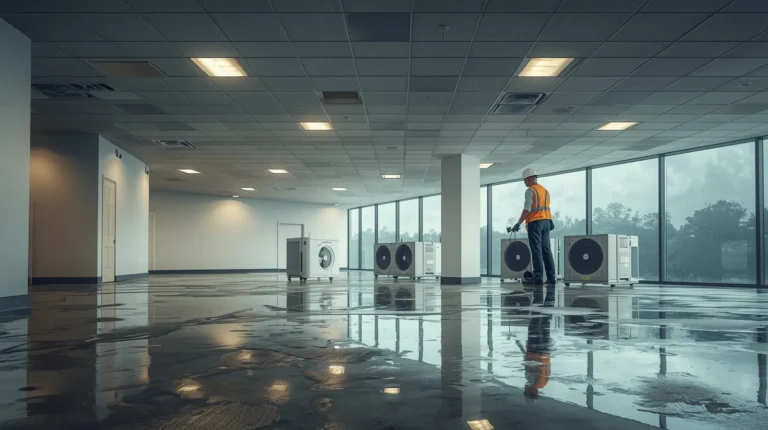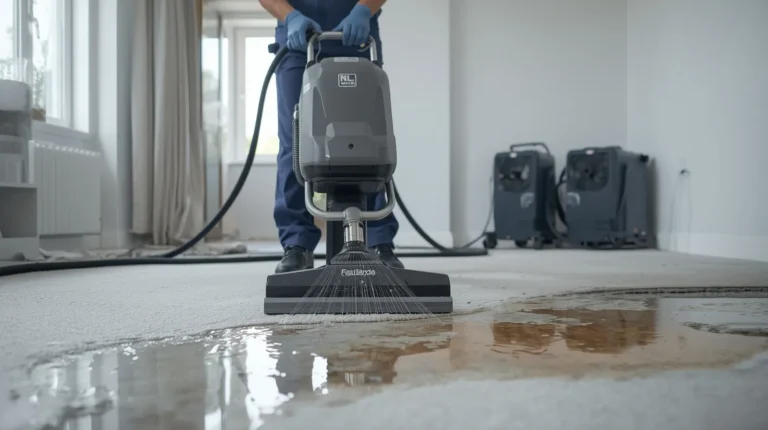If you’ve ever asked yourself Why does my kitchen sink drain smell, you’re not alone. A smelly drain can turn cooking, cleaning, and daily kitchen use into a frustrating experience. The good news is that foul sink odors usually come from clear causes like food particles, grease buildup, or plumbing issues. This blog explains where these smells come from, the risks they may pose, and how to remove them with simple fixes or professional help. By the end, you’ll know exactly what steps to take to keep your kitchen sink fresh and odor-free.
Understanding Kitchen Sink Odors: An Everyday Problem
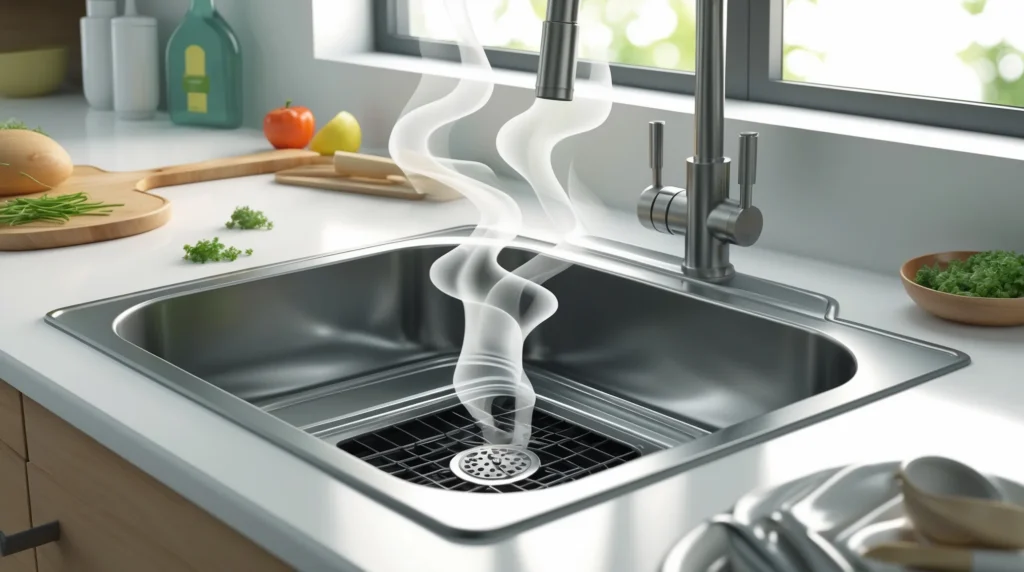
Kitchen sinks handle more than just water. Leftover food, grease, and soap often make their way down the drain. Over time, this can create buildup inside pipes. When debris sits too long, bacteria start to grow, releasing strong smells. The odor may seem minor at first, but it often gets worse without attention. Sink smells are not just an inconvenience; they can also signal plumbing problems. Learning the common causes helps you prevent serious issues later.
Where Do Kitchen Sink Smells Come From?
Smelly drains can start in a few places. Food particles and grease buildup in the pipes are frequent culprits. A garbage disposal that hasn’t been cleaned may also release odors. In some cases, mold and mildew grow inside damp spaces, adding to the stink. If the vent pipe becomes clogged, sewer gases can flow back into your kitchen. Even a leaky P-trap can let odors escape from the sewer line. Each source requires a specific fix, which is why identifying the problem is so important.
Why Does My Kitchen Sink Drain Smell? (Clear Answer)
The main reason your sink smells is usually a mix of trapped waste and poor drainage. Food scraps, grease, and soap can stick to pipe walls. As bacteria feed on these materials, bad smells are released. Sometimes, plumbing issues make the problem worse. A clogged vent or a dry U-bend can allow sewer gases to rise directly into the kitchen. In short, your sink smells because waste or gases aren’t moving where they should. Fixing this restores a clean, fresh kitchen.
Food Particles, Grease Buildup, and Drain Pipe Clogs
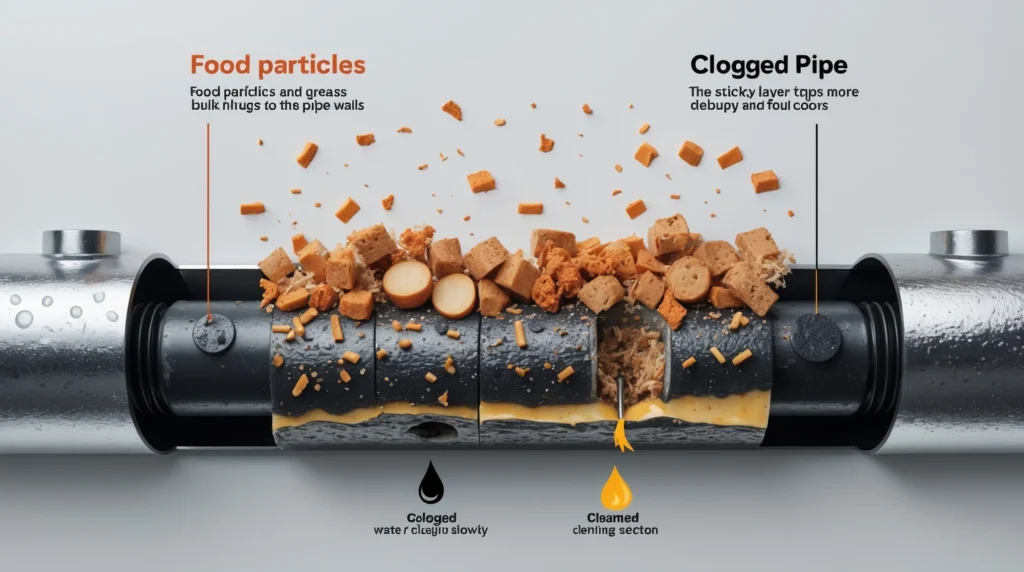
Small pieces of food and grease may seem harmless when washed down the drain. Over time, though, they cling to pipe walls and form a sticky buildup. This buildup traps more waste, creating clogs and releasing odors. When there’s a really big clog in the drain pipe, water may drain slowly or not at all. DIY drain cleaning with boiling water or baking soda and vinegar can help, but large clogs may need professional drain cleaning services to fully remove.
Mold, Mildew, and Bacterial Growth Inside Drains
Drains stay damp, which makes them the perfect place for mold and mildew. These organisms create a musty odor that smells different from food waste. Bacterial growth also thrives in pipes with organic matter. When bacteria break down food particles, they release gases that travel upward into your kitchen. Regular cleaning with natural remedies such as white vinegar can help kill bacteria. If mold has spread beyond the drain, it may be a sign of a larger moisture issue in the plumbing system.
Plumbing Issues: From Leaky P-Traps to Blocked Vent Pipes
Plumbing problems are another big source of drain odors. A leaky P-trap can cause a sewer smell from the kitchen sink. The P-trap normally holds water to block gases from entering your home. If it leaks or dries out, gases flow freely. A blocked vent can also cause a sewage smell from the kitchen sink. Vent pipes allow gases to escape outside, but when blocked, the gases return indoors. Fixing these issues often requires a plumber, since the repairs can involve sealing or replacing parts of the system.
Garbage Disposal Troubles and Gross Build-Up
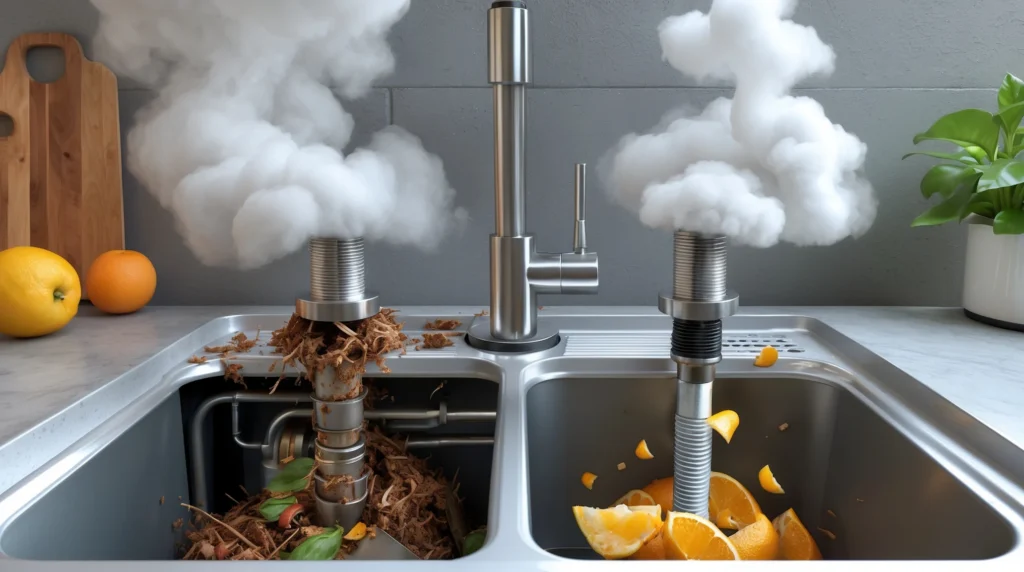
Your garbage disposal is one of the dirtiest parts of your kitchen. Over time, food waste sticks to the blades and walls. If not cleaned, it rots and creates powerful odors. Even if you run water, old particles may remain. Grinding citrus peels or flushing with vinegar can freshen the disposal. In cases of heavy buildup, it may need a deep cleaning or replacement. A gross disposal doesn’t just smell it can also damage your pipes by allowing grease and waste to harden inside.
DIY Drain Cleaning: Boiling Water, Vinegar, and Baking Soda
Many odors can be fixed with simple home remedies. Pouring boiling water down the drain once a week clears grease and soap scum. A mixture of baking soda and vinegar is another effective solution. The fizzing action breaks down light clogs and neutralizes odors. White vinegar can also kill bacteria and mold inside pipes. These DIY methods are safe, cheap, and easy to use. They don’t replace professional cleaning, but they work well for small problems and regular maintenance.
When Chemical Drain Cleaners or U-Bend Fixes Are Needed
If natural remedies don’t work, you may need stronger solutions. Chemical drain cleaners can break down stubborn clogs, but they should be used sparingly since they may damage pipes. Sometimes the problem is with the U-bend, the curved pipe under the sink. This part can collect debris and block water flow. Fixing problems with the U-bend usually involves removing it, cleaning it out, and sealing it back. For tough cases, calling a professional plumber is the safest choice.
Tips to Keep Your Sink Smelling Fresh in the Future
Once you’ve solved the odor, prevention is key. Avoid pouring grease, oil, or coffee grounds down the sink. Run hot water after each use to wash away small particles. Use white vinegar once a week to disinfect drains and prevent bacterial growth. Keep your garbage disposal clean with citrus or ice cubes. Regular checks of the P-trap and vent pipe help stop odors before they start. With these habits, you can enjoy a fresh-smelling kitchen every day.
Trusted Drain Cleaning Experts in Colorado Springs, CO – Colorado Stain Master
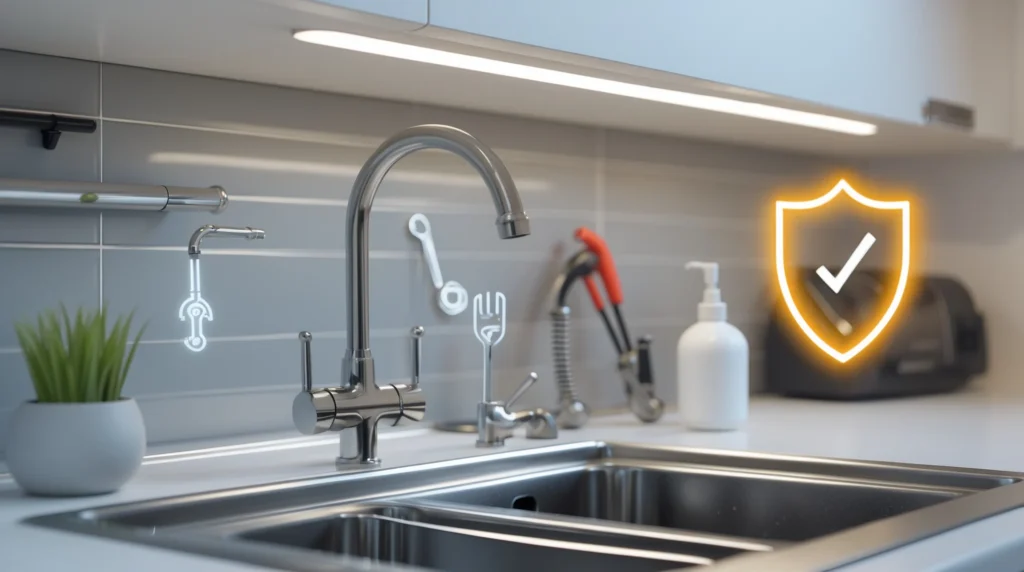
When kitchen sink smells don’t go away, professional help makes the difference. Services such as sewer cleaning, drain repair, and advanced plumbing fixes ensure the problem is gone for good. Colorado Stain Master has the tools, training, and expertise to handle everything from clogged drains to vent pipe repairs. With skilled plumbers and trusted service, they provide lasting solutions for kitchen sink odors. Whether it’s a blocked vent, leaky P-trap, or stubborn clog, their team restores comfort and peace of mind. Colorado Stain Master is committed to giving homeowners the expert care they deserve.
Conclusion
Kitchen sink odors are a sign of waste, bacteria, or plumbing issues that need attention. From food particles and grease buildup to mold, mildew, or clogged vent pipes, there are many reasons why smells develop. The good news is that most can be fixed with simple DIY steps like boiling water, vinegar, or baking soda. For harder problems, professional drain cleaning services or plumbing repairs may be necessary. Acting quickly prevents odors from spreading and keeps your home safe and fresh.
If you’re tired of dealing with bad odors from your kitchen sink, contact Colorado Stain Master today. Get expert help and enjoy a cleaner, fresher kitchen.

